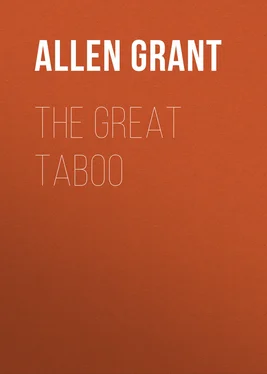Grant Allen - The Great Taboo
Здесь есть возможность читать онлайн «Grant Allen - The Great Taboo» — ознакомительный отрывок электронной книги совершенно бесплатно, а после прочтения отрывка купить полную версию. В некоторых случаях можно слушать аудио, скачать через торрент в формате fb2 и присутствует краткое содержание. Жанр: foreign_prose, literature_19, foreign_antique, на английском языке. Описание произведения, (предисловие) а так же отзывы посетителей доступны на портале библиотеки ЛибКат.
- Название:The Great Taboo
- Автор:
- Жанр:
- Год:неизвестен
- ISBN:нет данных
- Рейтинг книги:4 / 5. Голосов: 1
-
Избранное:Добавить в избранное
- Отзывы:
-
Ваша оценка:
- 80
- 1
- 2
- 3
- 4
- 5
The Great Taboo: краткое содержание, описание и аннотация
Предлагаем к чтению аннотацию, описание, краткое содержание или предисловие (зависит от того, что написал сам автор книги «The Great Taboo»). Если вы не нашли необходимую информацию о книге — напишите в комментариях, мы постараемся отыскать её.
The Great Taboo — читать онлайн ознакомительный отрывок
Ниже представлен текст книги, разбитый по страницам. Система сохранения места последней прочитанной страницы, позволяет с удобством читать онлайн бесплатно книгу «The Great Taboo», без необходимости каждый раз заново искать на чём Вы остановились. Поставьте закладку, и сможете в любой момент перейти на страницу, на которой закончили чтение.
Интервал:
Закладка:
"There wasn't a chance of picking 'em up," the captain said, with philosophic calm, as the men clambered on board again, and the Australasian got under way once more for the port of Honolulu. "I knew there wasn't a chance; but in common humanity one was bound to make some show of trying to save 'em. He was a brave fellow to go after her, though it was no good of course. He couldn't even find her, at night, and with such a sea as that running."
And even as he spoke, Felix Thurstan, rising once more on the crest of a much smaller billow—for somehow the waves were getting incredibly smaller as he drifted on to leeward—felt his heart sink within him as he observed to his dismay that the Australasian must be steaming ahead once more, by the movement of her lights, and that they two were indeed abandoned to their fate on the open surface of that vast and trackless ocean.
CHAPTER II.
THE TEMPLE OF THE DEITY
While these things were happening on the sea close by, a very different scene indeed was being enacted meanwhile, beneath those waving palms, on the island of Boupari. It was strange, to be sure, as Felix Thurstan had said, that such unspeakable heathen orgies should be taking place within sight of a passing Christian English steamer. But if only he had known or reflected to what sort of land he was trying now to struggle ashore with Muriel, he might well have doubted whether it were not better to let her perish where she was, in the pure clear ocean, rather than to submit an English girl to the possibility of undergoing such horrible heathen rites and ceremonies.
For on the island of Boupari it was high feast with the worshippers of their god that night. The sun had turned on the Tropic of Capricorn at noon, and was making his way northward, toward the equator once more; and his votaries, as was their wont, had all come forth to do him honor in due season, and to pay their respects, in the inmost and sacredest grove on the island, to his incarnate representative, the living spirit of trees and fruits and vegetation, the very high god, the divine Tu-Kila-Kila!
Early in the evening, as soon as the sun's rim had disappeared beneath the ocean, a strange noise boomed forth from the central shrine of Boupari. Those who heard it clapped their hands to their ears and ran hastily forward. It was a noise like distant rumbling thunder, or the whir of some great English mill or factory; and at its sound every woman on the island threw herself on the ground prostrate, with her face in the dust, and waited there reverently till the audible voice of the god had once more subsided. For no woman knew how that sound was produced. Only the grown men, initiated into the mysteries of the shrine when they came of age at the tattooing ceremony, were aware that the strange, buzzing, whirring noise was nothing more or less than the cry of the bull-roarer.
A bull-roarer, as many English schoolboys know, is merely a piece of oblong wood, pointed at either end, and fastened by a leather thong at one corner. But when whirled round the head by practised priestly hands, it produces a low rumbling noise like the wheels of a distant carriage, growing gradually louder and clearer, from moment to moment, till at last it waxes itself into a frightful din, or bursts into perfect peals of imitation thunder. Then it decreases again once more, as gradually as it rose, becoming fainter and ever fainter, like thunder as it recedes, till the horrible bellowing, as of supernatural bulls, dies away in the end, by slow degrees, into low and soft and imperceptible murmurs.
But when the savage hears the distant humming of the bull-roarer, at whatever distance, he knows that the mysteries of his god are in full swing, and he hurries forward in haste, leaving his work or his pleasure, and running, naked as he stands, to take his share in the worship, lest the anger of heaven should burst forth in devouring flames to consume him. But the women, knowing themselves unworthy to face the dread presence of the high god in his wrath, rush wildly from the spot, and, flinging themselves down at full length, with their mouths to the dust, wait patiently till the voice of their deity is no longer audible.
And as the bull-roarer on Boupari rang out with wild echoes from the coral caverns in the central grove that evening, Tu-Kila-Kila, their god, rose slowly from his place, and stood out from his hut, a deity revealed, before his reverential worshippers.
As he rose, a hushed whisper ran wave-like through the dense throng of dusky forms that bent low, like corn beneath the wind, before him, "Tu-Kila-Kila rises! He rises to speak! Hush! for the voice of the mighty man-god!"
The god, looking around him superciliously with a cynical air of contempt, stood forward with a firm and elastic step before his silent worshippers. He was a stalwart savage, in the very prime of life, tall, lithe, and active. His figure was that of a man well used to command; but his face, though handsome, was visibly marked by every external sign of cruelty, lust, and extreme bloodthirstiness. One might have said, merely to look at him, he was a being debased by all forms of brutal and hateful self-indulgence. A baleful light burned in his keen gray eyes. His lips were thick, full, purple, and wistful.
"My people may look upon me," he said, in a strangely affable voice, standing forward and smiling with a curious half-cruel, half-compassionate smile upon his awe-struck followers. "On every day of the sun's course but this, none save the ministers dedicated to the service of Tu-Kila-Kila dare gaze unhurt upon his sacred person. If any other did, the light from his holy eyes would wither them up, and the glow of his glorious countenance would scorch them to ashes." He raised his two hands, palm outward, in front of him. "So all the year round," he went on, "Tu-Kila-Kila, who loves his people, and sends them the earlier and the later rain in the wet season, and makes their yams and their taro grow, and causes his sun to shine upon them freely—all the year round Tu-Kila-Kila, your god, sits shut up in his own house among the skeletons of those whom he has killed and eaten, or walks in his walled paddock, where his bread-fruit ripens and his plantains spring—himself, and the ministers that his tribesmen have given him."
At the sound of their mystic deity's voice the savages, bending lower still till their foreheads touched the ground, repeated in chorus, to the clapping of hands, like some solemn litany: "Tu-Kila-Kila speaks true. Our lord is merciful. He sends down his showers upon our crops and fields. He causes his sun to shine brightly over us. He makes our pigs and our slaves bring forth their increase. Tu-Kila-Kila is good. His people praise him."
The god took another step forward, the divine mantle of red feathers glowing in the sunset on his dusky shoulders, and smiled once more that hateful gracious smile of his. He was standing near the open door of his wattled hut, overshadowed by the huge spreading arms of a gigantic banyan-tree. Through the open door of the hut it was possible to catch just a passing glimpse of an awful sight within. On the beams of the house, and on the boughs of the trees behind it, human skeletons, half covered with dry flesh, hung in ghastly array, their skulls turned downward. They were the skeletons of the victims Tu-Kila-Kila, their prince, had slain and eaten; they were the trophies of the cannibal man-god's hateful prowess.
Tu-Kila-Kila raised his right hand erect and spoke again. "I am a great god," he said, slowly. "I am very powerful. I make the sun to shine, and the yams to grow. I am the spirit of plants. Without me there would be nothing for you all to eat or drink in Boupari. If I were to grow old and die, the sun would fade away in the heavens overhead; the bread-fruit trees would wither and cease to bear on earth; all fruits would come to an end and die at once; all rivers would stop forthwith from running."
Читать дальшеИнтервал:
Закладка:
Похожие книги на «The Great Taboo»
Представляем Вашему вниманию похожие книги на «The Great Taboo» списком для выбора. Мы отобрали схожую по названию и смыслу литературу в надежде предоставить читателям больше вариантов отыскать новые, интересные, ещё непрочитанные произведения.
Обсуждение, отзывы о книге «The Great Taboo» и просто собственные мнения читателей. Оставьте ваши комментарии, напишите, что Вы думаете о произведении, его смысле или главных героях. Укажите что конкретно понравилось, а что нет, и почему Вы так считаете.












